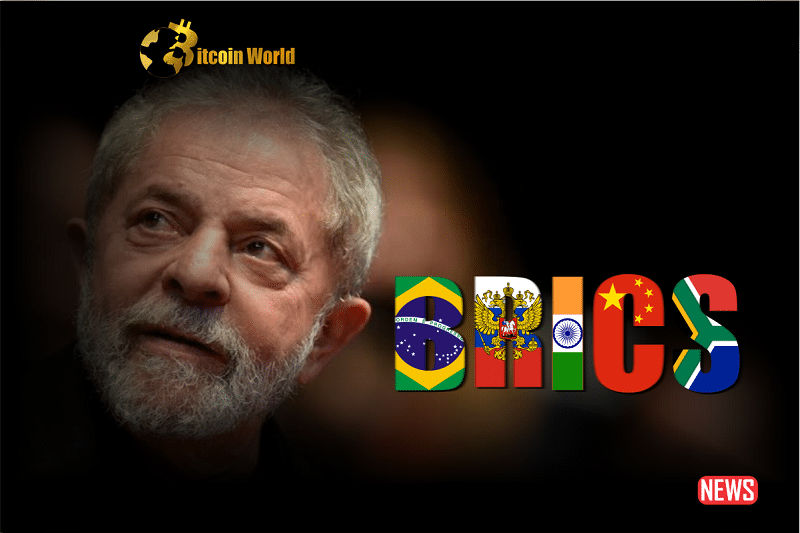Imagine a world where trade flows smoothly between nations without the constant need for a middleman currency. That’s the vision Brazilian President Luiz Inácio Lula da Silva is pushing, and it’s got the global financial stage buzzing. At the heart of it? De-dollarization, the move away from relying solely on the U.S. dollar for international transactions. Let’s dive into why this is making waves, especially within the BRICS nations.
Why Question the Dollar? Lula’s Perspective
President Lula didn’t mince words at the recent Paris summit. He posed a straightforward yet powerful question: why should Brazil and Argentina trade with each other using U.S. dollars? And why can’t Brazil and China conduct their significant trade in their own respective currencies? It’s a fundamental point about efficiency and sovereignty. Think about it – every time these countries trade using dollars, they incur extra steps and potential costs. Lula’s highlighting a valid concern that many nations are starting to echo.
BRICS to the Rescue? The Johannesburg Agenda
The upcoming BRICS summit in Johannesburg (August 22nd-24th) is shaping up to be a crucial platform for this discussion. BRICS, comprising Brazil, Russia, India, China, and South Africa, represents a significant bloc of the global economy. Lula’s intention to raise de-dollarization here underscores its importance. This isn’t just about Brazil; it’s about fostering a more multi-polar financial world.
De-Dollarization: What’s the Buzz About?
De-dollarization might sound like a complex term, but the core idea is simple: reducing the reliance on the U.S. dollar in international trade and finance. Why is this gaining traction?
- Reduced Transaction Costs: Trading directly in national currencies can eliminate exchange rate fees and complexities associated with using a third currency.
- Increased Economic Independence: Less dependence on the dollar can shield economies from U.S. monetary policy fluctuations.
- Boosting National Currencies: Promoting the use of local currencies can strengthen their international standing.
The Paris Summit: Setting the Stage
The Paris summit, hosted by French President Emmanuel Macron, aimed to forge a new global financial pact. While the focus was broader than just de-dollarization, Lula’s comments there served as a strong precursor to the BRICS discussions. The summit highlighted the growing desire for a more equitable and adaptable international financial system.
Challenges and Opportunities
While the idea of de-dollarization is appealing, it’s not without its hurdles:
| Challenge | Opportunity |
|---|---|
| Establishing Trust: Building confidence in alternative currencies requires time and consistent economic stability. | Strengthening Regional Ties: Promoting trade in national currencies can foster deeper economic integration within blocs like BRICS. |
| Currency Volatility: Some national currencies might experience greater volatility compared to the dollar. | Developing Alternative Financial Infrastructure: The BRICS bank offers a potential avenue for financing and reducing reliance on traditional Western institutions. |
| Global Adoption: Widespread de-dollarization requires a significant shift in global financial practices. | Creating a More Balanced System: Reducing dollar dominance could lead to a more resilient and less centralized global financial architecture. |
The BRICS Bank: A Key Player?
President Lula sees the New Development Bank (NDB), often referred to as the BRICS bank, as a crucial tool in this endeavor. He envisions it as a strong alternative financial institution, capable of providing financing and fostering greater cooperation, particularly with entities like the African Development Bank. This signifies a move towards creating their own financial ecosystems, less reliant on traditional Western-dominated systems.
Will a Common BRICS Currency Emerge?
Drawing inspiration from the Eurozone, Lula has openly supported the idea of a common currency among BRICS nations. While this is a long-term aspiration with significant complexities, it signals a clear intent to explore alternatives to the dollar. Imagine the impact of a unified BRICS currency on global trade and finance!
Looking Ahead: What Does This Mean?
President Lula’s strong stance on de-dollarization within the BRICS framework is more than just talk. It reflects a growing global sentiment towards diversifying financial systems and reducing dependence on a single dominant currency. The upcoming BRICS summit promises to be a pivotal moment in this ongoing discussion. While the dollar’s reign won’t end overnight, Lula’s push is a significant step towards a potentially more multi-polar financial future. Keep an eye on the outcomes of the BRICS meeting – they could reshape the landscape of international trade and finance.
Disclaimer: The information provided is not trading advice, Bitcoinworld.co.in holds no liability for any investments made based on the information provided on this page. We strongly recommend independent research and/or consultation with a qualified professional before making any investment decisions.


